
Topics
Guests
- Marsha Levickco-founder and chief counsel of the Juvenile Law Center, based in Philadelphia. The Juvenile Law Center helped expose the corrupt judges and is now involved in the families’ class action suit.
- Sandy Fonzomother of Edward Kenzakoski, who was sentenced by Luzerne County Judge Mark Ciavarella, Jr., to four months in boot camp and 30 days in a youth jail. Kenzakoski committed suicide last June, and Fonzo believes his death is related to his treatment by Ciavarella.
A federal jury has found a former Pennsylvania judge guilty of participating in a so-called “kids for cash” scheme, in which he received money in exchange for sending juvenile offenders to for-profit youth jails over the years. Former Luzerne County Judge Mark Ciavarella, Jr., was convicted Friday of accepting bribes and kickbacks for putting juveniles into detention centers operated by PA Child Care and a sister company, Western Pennsylvania Child Care. Ciavarella and another judge, Michael Conahan, are said to have received $2.6 million for their efforts. Ciavarella faces a maximum sentence of 157 years in prison, in addition to a class action lawsuit on behalf of the youths’ families. For more on this story, we are joined by Marsha Levick of the Juvenile Law Center and to Sandy Fonzo, who believes her son’s suicide was related to his treatment by Ciavarella. [includes rush transcript]
Transcript
AMY GOODMAN: Who goes to jail, and who remains free? A federal jury has found a former Pennsylvania judge guilty in a so-called “kids for cash” scheme, in which he took money in exchange for sending juvenile offenders to for-profit youth jails. Former Luzerne County Judge Mark Ciavarella, Jr., was convicted Friday in a case centering on his acceptance of bribes and kickbacks for putting juveniles into detention centers operated by the companies PA Child Care and a sister company, Western Pennsylvania Child Care. Ciavarella and another judge, Michael Conahan, are said to have received $2.6 million for their efforts. Some of the young people sentenced under their watch were jailed over the objections of their probation officers. Ciavarella faces a maximum sentence of 157 years in prison, in addition to a class action lawsuit on behalf of the youth’s families.
We’re joined on the line by Sandy Fonzo. Her son, Edward Kenzakoski, was sentenced by Ciavarella to a youth jail and then a four-month boot camp. Edward committed suicide last June. Confronting Judge Ciavarella outside the courtroom Friday, Sandy Fonzo blamed him for her son’s death.
SANDY FONZO: My kid’s not here! He’s dead, because of him! He ruined my [bleep] life!
AMY GOODMAN: That was Sandy Fonzo confronting Judge Ciavarella. Sandy now joins us on the phone from work. She only has a minute.
Sandy, thank you so much for being there. Your thoughts? He, the judge, has been released pending appeal. What are your feelings today? What happened to your son?
SANDY FONZO: It’s just so gut-wrenching. Like I said, I planned on going there that day. I just wanted to see him being taken out by the court marshals in cuffs. I didn’t want to have him to see that beautiful day. I wanted to see him go to prison. I wanted to feel a little bit justice and remorse for my son. And I got there and found out that he was going home, he was free, he was going with his family. He had two years to get this case together. Those kids had a minute. He went home free with his family. Those kids were shackled and taken to — nobody even knew where they were being taken to. Nobody knew what was going on.
AMY GOODMAN: Sandy?
SANDY FONZO: It was shock. It was just plain horror.
AMY GOODMAN: Sandy, explain what happened to Edward. Explain —
SANDY FONZO: There was no appealing for them.
AMY GOODMAN: Explain what happened to your son, the first time. The judge sent him to jail twice.
SANDY FONZO: Yes.
AMY GOODMAN: Explain what happened the first time, how he ended up in the judge’s court.
SANDY FONZO: He was just — he was 17. He was at an underage drinking party. And my son just had so much going for him. He was — he wrestled since he was four years old. This was his senior year. He was expected to take state in his high school. He would have been the only one in the history of that school and was looking at a scholarship to anywhere in the country. He just had such a bright future. And I saw him, you know, the end of the summer, hanging around with a different crowd, and he was sneaking out at night. And he just had too much to lose. And we went to school with two Wilkes-Barre police officers, and we sent them in when we knew he was there. He was supposed to be home, and he was at this drinking party, and we sent them in to get him out. They thought they were helping.
AMY GOODMAN: So you sent the cops in to help your son?
SANDY FONZO: Yeah, yeah, right. All we wanted was, you know, a little slap on the hand and give him a little scare, straighten him out, and that’s what it was supposed to be. We all sat — those cops, the judge, [inaudible] — we all sat there, we explained what it was. Letters of this kid’s character came in. “He’s a great kid. We just need to put a little scare into him.” “Oh, you know, that’s what we’ll do. We’re going to take care of it. We’ll put the scare of God into him.” And before we knew it, he was shackled, and he was taken. And I just remember his face looking at me. And it was just – it was horror. It was almost like — you know, he’s my kid, and I had just no control. They actually — at one time, while they had him in that juvenile center, he called me the next day. He’s in some place hours away. They needed a bed to fill for somebody else, so they moved him in the middle of the night, pouring down rain. I didn’t even know where my 17-year-old son was. I was having like a nervous breakdown. This whole thing has been nothing but a nightmare, and it just has never ended. It never ended. And now I live with this nightmare the rest of my life.
And I just want him to at least pay for what he’s done. I mean, these people are to protect our kids. He was the adult here. He made these kids all think that they’re such bad kids. And, you know, it’s just terrible the way he beat them down. They’re not bad kids. I want them to know: it wasn’t them, it was him. They’re not bad. I want them to heal and go on with their lives so nothing happens to them like it did to my son.
AMY GOODMAN: Sandy Fonzo, I want to thank you for taking the time, and I’m sorry to make you relive what happened. Thanks so much, Sandy, for being with us. Again, it was Judge Mark Ciavarella who sentenced her son Edward Kenzakoski to four months in a boot camp, 30 days in a youth jail. Edward committed suicide last June.
We’re going to go now to Philadelphia, to Marsha Levick, co-founder [and] the chief counsel of the Juvenile Law Center based in Philadelphia. The Juvenile Law Center helped expose the corrupt judges now involved in the families’ class action suit.
Explain what he got for putting Edward and other children like Edward in jail, Marsha Levick. What did the judge get?
MARSHA LEVICK: Well, the judge has been convicted of very significant federal crimes. He was convicted of racketeering. He was convicted of money laundering, as well as tax evasion and mail fraud. He’s facing a minimum, we’ve heard, of approximately 12 to 15 years in prison. His exposure, as I think you mentioned at the beginning of the show, is obviously well over 150 years. But the charges that he was convicted of are quite serious.
AMY GOODMAN: Right. And when I say, “What did he get?” I meant for putting Edward and the other kids in jail? Was it hundreds or thousands of kids? Explain the money that he got, this “cash for kids” deal.
MARSHA LEVICK: Sure, I’m sorry. The “cash for kids” deal really was about monies being paid by the developer who built the original facility and then added on another facility, one in Luzerne County and one in western Pennsylvania, as well as monies that were provided by the former co-owner of the facility to Judge Ciavarella and Judge Conahan. There were essentially four principal participants to this corruption scheme. And the original money we — the original information filed by the U.S. attorney was about $2.6 million. By the time the case went to trial, the numbers were up to about $2.9 million.
AMY GOODMAN: I want to go to a clip right now. Michael Moore’s last film, Capitalism: A Love Story, the documentary, addressed the issue of kids for cash. This clip features interviews with some of the young people the judge has ordered into detention.
YOUNG WOMAN 1: I went in front of the court, in front of Mr. Ciavarella, and I wasn’t even in front of him for four minutes.
YOUNG WOMAN 2: I was only in front of him for like two minutes.
YOUNG WOMAN 3: The first thing that Judge Ciavarella said to me was, “What makes you think you can do this kind of crap?”
YOUNG MAN 1: I’m sure he knew in his mind, when I walked in, that was locking this kid up no matter what.
YOUNG WOMAN 1: He didn’t even look at me.
YOUNG MAN 1: Once I entered the courtroom, I didn’t have any chance.
YOUNG WOMAN 1: There was about six kids who went in front of me. Every single kid who went in front of Ciavarella, for all different reasons, some minor, some serious, got sent away.
MICHAEL MOORE: Although Wilkes-Barre is located in the United States of America, here, capitalism trumped democracy. Robert Powell, one of the owners of PA Child Care, cut a business deal with Judge Conahan and Judge Ciavarella. Judge Ciavarella then stepped up his conviction rates. Many of these kids were funneled into PA Child Care’s for-profit juvenile facility.
AMY GOODMAN: An excerpt of Capitalism: A Love Story. Marsha Levick, we just have 30 seconds. You are involved in a class action suit. What are you demanding?
MARSHA LEVICK: We’re looking for money damages, compensation for the children and their families that were subjected to what happened in Ciavarella’s courtroom. Those clips describe, really, a very rough injustice, swift injustice. Kids had no constitutional rights to counsel, quickly were led off and away in shackles and handcuffs. And we’d like to see them compensated for what happened to them.
AMY GOODMAN: Well, I want thank you, Marsha Levick, for joining us, chief counsel of the Juvenile Law Center based in Philadelphia, which helped expose the corrupt judges now involved in the families’ class action suit. On our website, you can go to show where we talked to some of the children who were sentenced and how their lives were destroyed after coming out of jail.

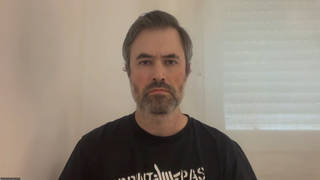
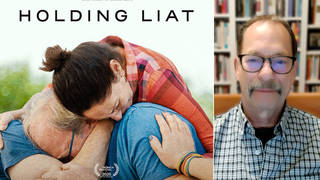
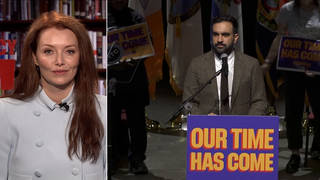
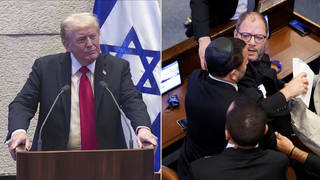






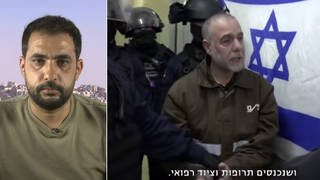
Media Options